Keyword Research for Small Businesses explained
What are Keywords? According to Moz.com’s definition, Keywords are ideas and topics that define what your content is about. In terms of SEO, they’re the words and phrases that searchers enter into search engines, also called “search queries.” In other words, you need to carry out research on the words and phrases searchers use online when looking for the products or services that you sell. If you are new to this concept, then our handy guide to keyword research for small businesses will be illuminating.
How do you find out about what users are searching for?
Using Google Autosuggest.
Here is an example of using the Google autosuggest feature to help you see what terminology your customers use when looking for your type of business.
In this first series I am assuming the role of a café owner in Kirkwall Orkney. This is a remote island off the North Coast of Scotland only reachable by ferry. Therefore it will not be an overly popular search term, but will be known by locals and regular visitors. What words should I use in my social media descriptions, web pages, blogs?
First I tried ‘Cafes Kirkwall’
The first result is the Google Map Pack, so I must make sure my business is on Google My Business.
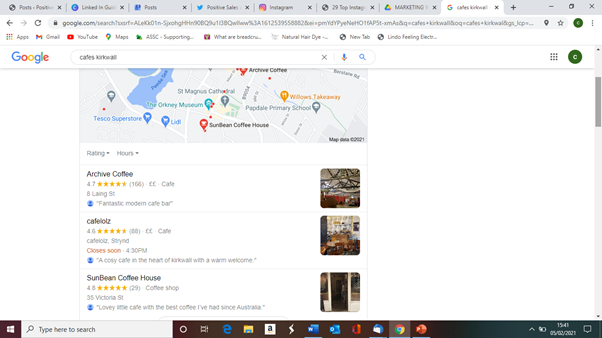
But if I am a café owner in Kirkwall what other phrases are people using to search, are they any specific things they are looking for? In this next example when we look at the Google autosuggest drop down we can see that specific names are being entered, which suggests that locals or regular visitors are searching as they know the business names. So I can make sure my content is aimed at them.
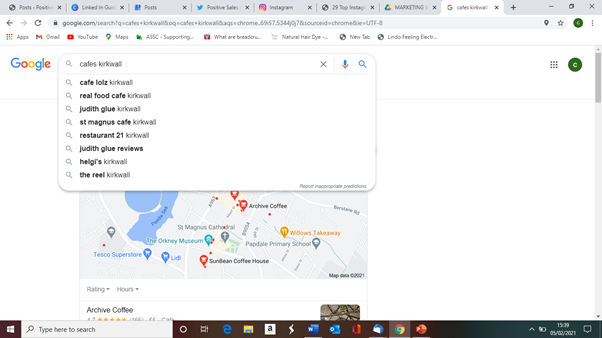
Looking for very specific phrases is what you should aim for because this gives you something that is not super popular and will be more likely to get you found as you are not competing with as many other sites who will be going for the obvious.
If you are a location based business then you will naturally want to rank for business type and location as above. So how do you go beyond the obvious? Try typing in alternatives and see what Google suggest comes up with. So still with the same theme of being a café owner in Kirkwall, I put myself in the shoes of a tourist and Googled ‘Places to eat Kirkwall’ – Now the autosuggest is getting more creative.
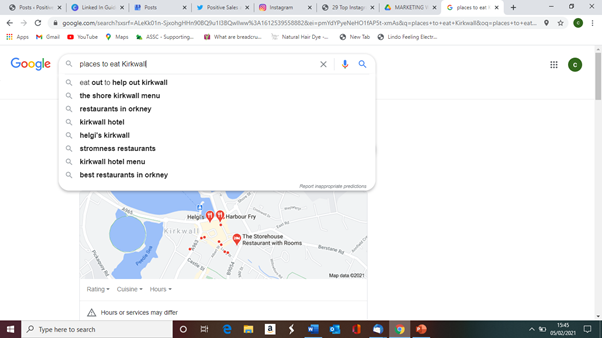
‘Eat out to help out’ is topical, ‘best restaurants in Orkney’ are two more phrases that could be used in content. Putting in Cafes Orkney yielded a segment of dog friendly cafes and cafes in Kirkwall, how about being more specific again?
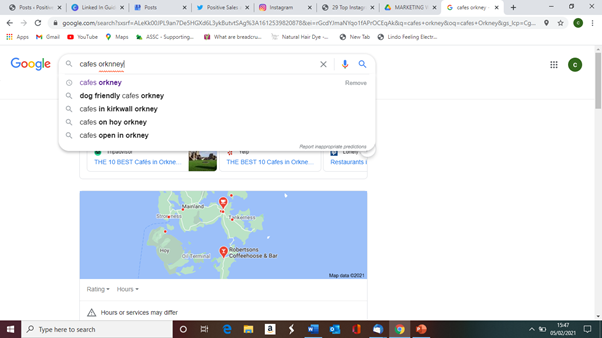
Being a rural location, there are not many keywords or phrases to deviate from, so following a basic SEO strategy will yield good results.
But what of busier places like cities? You would have to be more creative. Look what happens in autosuggest if looking for a vegetarian café in Glasgow
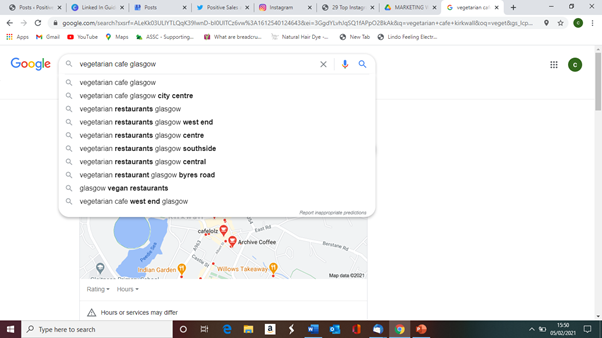
Glasgow being a large area – users are specifying different parts of the city and even putting in road names. Therefore, carrying out research beforehand helps you to align what you offer and how you describe your services online with what your users are searching for.
Keyword Research for Service Businesses
What if you aren’t a physical premises and you are a service? There are more tools again that you can work with.
In this next series of examples, I am now an outside catering business. First I googled ‘Outside Catering’ with no specific location. This was in the hope of eeking out some potential blog topics or subject matter for social posts that don’t have to be geographically specific.
Google suggest came up with the obvious geographical ‘near me’ but further down are some interesting angles of ‘outside catering meaning’, ‘for weddings’, ‘ideas’ and ‘company’. Therefore, if you provide outside catering services this is useful information. If you do cater for weddings, then some blogs or pages dedicated to this service on your website or social channels will help optimise your presence.

Other Great Online Tools
If you are doing keyword research for a service-based business and regularly blog, then there is another feature that you can make use of for blog topics and it’s the ‘Questions People Ask’ segment of the search engine results page. These don’t always appear, it depends on the subject matter, but it’s something to look out for when carrying out your investigations.
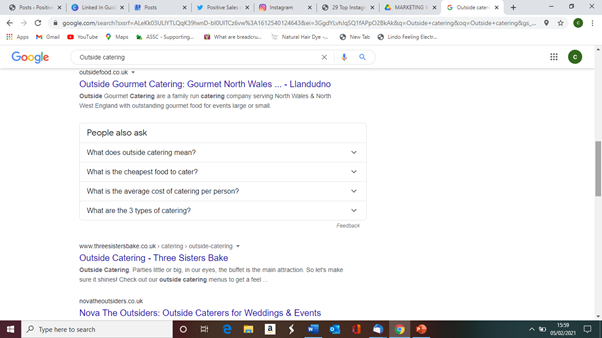
As you can see there are some potential ideas above ‘What does outside catering mean?’ or ‘What is the average cost of catering per person?’ would be interesting articles to write.
Further down this page there are also other suggestions in the ‘Searches related to outside catering’ segment.
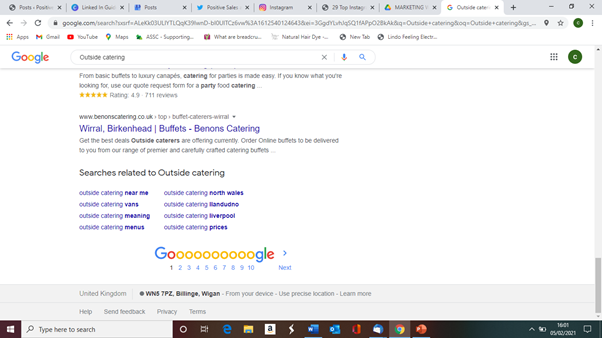
As well as Google, Bing will also have similar information and may have different results than Google and may be worth exploring.
Casting the net wider
Below is a list of online platforms that allow you to carry out more in-depth research.
If you are a producer of regular content, written or visual, the starting point is always keyword research. If you are going to be doing this on a regular basis I advise that you embed the ‘Keywords Everywhere’ app into your Google Chrome platform. Every time you carry out a query it will display the keywords down the right hand side automatically with some graphical data.
9 Top free Keyword Research Tools 2021
- Uber Suggest
- Google Trends
- Keywords Everywhere
- Google and Youtube suggest
- Bing forums
- Exploding topics.com
- Wikipedia
- Answer the public – this allows limited daily searches and there is a monthly fee if you need to go beyond it, but for content creation is well worth the outlay as it is a goldmine for not only keyword research but market research as well.
Where should you use keywords?
Don’t get carried away.
There is an online etiquette around this science. At the end of the day, we need to write for the reader not the search engines. Therefore, the algorithms look for naturally written content, so as long as you start the web page, article or advertisement with the keyword, the rest of the content can use synonyms.
Google looks for around 1% penetration, so for a 300-word article the keyword or phrase only needs to appear three times. One of those will be in the first paragraph and one will be a subheading. Leaving one to show at any other point in the narrative. Anything above this will viewed as keyword stuffing and you will be penalised.
To follow best practice, use your chosen words or phrases in the title of any page or article (which should be labelled with H1 or Header tag you can find this label in your text box editor), a subheading and the first paragraph. The longer the content then there will need to be more appearances.
Blind Bots
If there are images or video within the content, the keywords will need to be embedded into those as the bots that index content can only read text. The keyword labelling tells the bots what the image is about and that it is related to the wider content. There is a box called Alt Text this must be filled in along with other boxes that appear within the image such as description and caption.
Organic and Paid Content
Researching keywords for organic content is straightforward if you look for what people are searching for and you consistently post and create, the tip for organic is get as niche as you can. When analysing words and phrases for paid advertising it can be a bit tricky because you are bidding on them and the prices fluctuate like the stock market and it can be expensive.
Using Uber Suggest or Google Keyword Planner will give you in depth metrics on search volume, words your competitors use, their highest performing articles or pages and what receives the best engagement.
Organic content is always a long-term strategy as it takes time to perform and build brand awareness, so people know that you exist and where to find you.
If you are a new business, paid ads are a great way to get instant visibility based on keywords. If you want to know which keywords are performing well, use these tools to carry out in depth study. It may also be worth viewing the ads in the search engine results page to see what phrase they rank number one on.
The search engine results pages usually return paid ads above the Google Map Pack and above organically performing sites, they always have ‘Ad’ written next to them to indicate they have ranked based on paid positioning.
In this example I googled Plumbers Near Me and the first results were Ads, this is probably due to the time of year, the high demand for plumbers and the amount of competition, meaning it is worth their while to pay for the visibility.

Paying other businesses to operate your search engine ranking
It can be tempting when running a business to pay agencies hundreds of pounds per month to run your ads for you. For the average small business this is not necessary. If you are a local business then make use of Google My Business, Facebook ads and other local SEO tactics. If you are an E commerce business then Google Ads will pay dividends, to begin with, try running them yourself. Google has plenty of resources, guides, tutorials and staff to assist you in getting to grips with the science of paid ads. You are best investing time in taking the Google tutorials and learning through trial and error, thus leaving more budget for ads rather than paying third parties.
Thank you
For taking the time to read our blogs. Positive Sales and Marketing is a small business in the North West of England passionate about educating the UK hospitality and freelance artist sector on understanding their marketing.
We offer training and education to enable businesses to take control of their own destiny rather than blindly relying on agencies. We can also offer transparent website design services and copywriting should this be taking up too much of your time.
We work with clients all over the UK and also operate directories for the holiday accommodation sector.
We would love to hear from you, give us a call on 01257 433331 or 01744 670055 or email Caroline@positivesalesandmarketing.co.uk
You can also find us on Twitter @Psalesmarketing or Instagram possalesmarketing – please follow us to read our blogs or receive daily inspiration.

